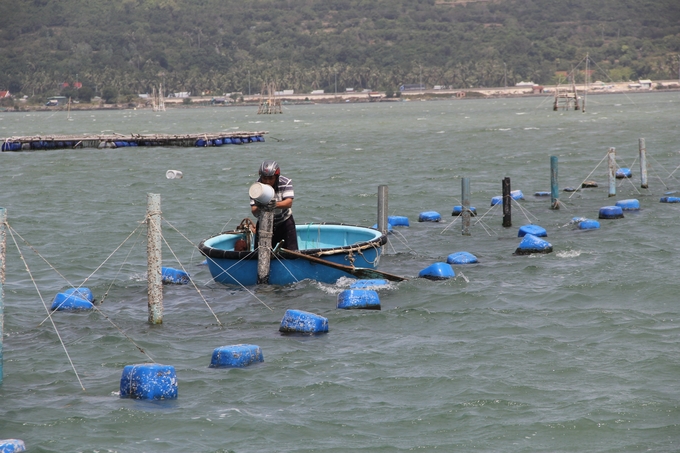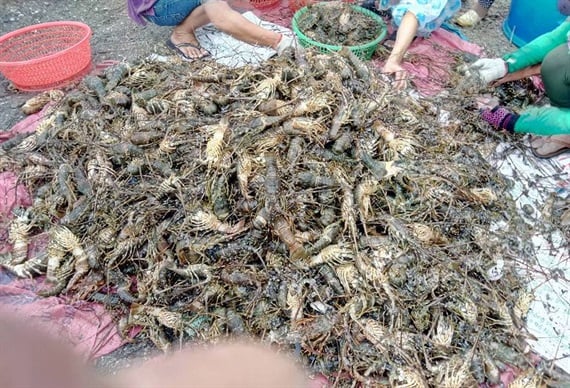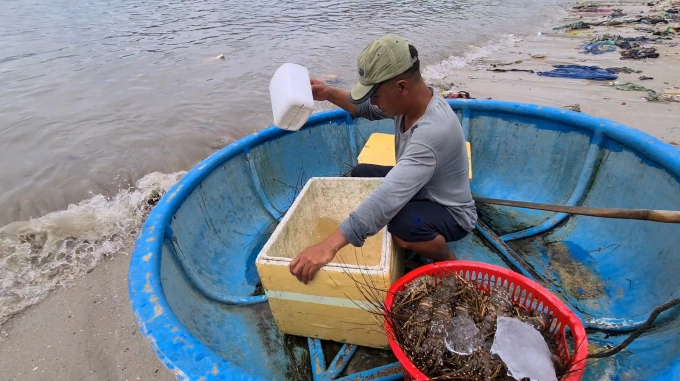November 15, 2025 | 12:04 GMT +7
November 15, 2025 | 12:04 GMT +7
Hotline: 0913.378.918
November 15, 2025 | 12:04 GMT +7
Hotline: 0913.378.918
Tran Van Tuan, a farmer raising lobster in in cages in Xuan Yen ward, Song Cau town (Phu Yen), said that in recent years, the water quality in the aquaculture area has not been guaranteed with environmental problems often occurring, causing heavy damage to fish and shrimp so farmers become exhausted.

In recent years, the lobster farming area in Song Cau town has often suffered from environmental incidents, causing damage to farmed shrimp. Photo: KS.
Authority practical inspection has showed that the situation of shrimp and fish deaths often occurred in a short and sudden time. Before it happened, the water environment in farming areas and the health status of farmed fish were not abnormal and without any signs of disease. An unforgettable environmental incident happened to lobster farmers in Song Cau town in 2017, killing millions of lobsters, causing heavy damage to farmers. Most recently, on August 10, at Dam Dan farming area in Phuoc Ly quarter, Xuan Yen ward, the sudden death also occurred to lobster and sea fish raised in cages. According to Phu Yen Department of Agriculture and Rural Development, it is estimated that 200 cages with 30,740 lobsters and 1,220 fish of all kinds, mainly grouper and cobia, were damaged. Dead lobster and fish were with different sizes, even reaching big sizes for sale. When shrimp and fish died, the water environment in the coastal area turned reddish brown.

In 2017, an environmental incident caused severe damage to lobster farmers in Song Cau town. Photo: KS.
Meanwhile, water emergency monitoring results from samples collected by the provincial Department of Aquatic Resources in the aquaculture farming area with sudden death of lobsters in Phuoc Ly neighborhood - Xuan Yen ward on August 11 showed that water quality was bad with a low dissolved oxygen index while the degree of N-NH4+, COD, P-PO43- are over the allowable limit.
Therefore, from the above data, the Department of Agriculture and Rural Development stated that shrimp and fish cultured in cages died due to environmental problems (lack of oxygen and asphyxiation) similar to that of cage-raised aquatic species dying due to environmental change happened in recent years in Song Cau town.
To limit risks and reduce damage caused by environmental incidents, epidemics and natural disasters such as heat, rain, storms, etc. for cage aquaculture farmers in the coming time, Mr. Nguyen Tri Phuong, Deputy Director of the Department Phu Yen Agriculture and Rural Development proposed the People's Committee of Song Cau town to direct the Economic Department, the People's Committees of communes and wards and relevant units to propagate and mobilize farmers to raise livestock following local plans, as well as regulations on prevention of diseases in aquaculture.

To limit environmental incidents and diseases, farmers need to comply with the planning, protect the environment and collect leftovers and domestic waste for treatment. Photo: TTh.
In addition, there should be measures to manage farming areas and prevent widespread aquaculture development which are not following a plan that causes loss of control, overloading the farming environment. The local authorities should also mobilize farmers to collect dead aquatic products, leftover food, and waste from aquaculture activities to bring them ashore for treatment so as to limit environmental pollution in the farming area. They should provide information about monitoring results in various forms and issue environmental warnings and epidemics via functional units so that farmers can timely undertake measures to proactively prevent and limit risks and inform the functional sector when there are problems about diseases and the environment in the farming area with the aim to prevent and reduce damage to farmers. Localities should recommend and propagate for farmers to sell shrimp and aquaculture products when they reach commercial size and do not hold up to waiting for increasing prices. The number of cages and shrimp farms should be reduced to the lowest when the weather changes and before storm season.
Development asked the Sub-Department of Fisheries to guide farmers to comply with the state's current regulations on aquaculture, apply technical measures in raising and respond to environmental changes in aquaculture. Samples for environmental monitoring and warning should be regularly collected and especially increased with the frequency of sampling at times of sudden weather change or prolonged heat in areas with high risk of environmental incidents. to promptly advise farmers to proactively apply effective preventive measures.
The Sub-Department of Livestock Production and Veterinary Health should actively capture information and inspect the situation of farmed aquatic production when death or disease occurs; update reports on epidemic in accordance with regulations, identify causes, analyze, evaluate and guide farmers to proactively apply solutions to prevent and reduce damage.
Translated by Linh Nguyen
/2025/11/14/1144-0-nongnghiep-231139.jpg)
(VAN) Ban Bo commune (Lai Chau province), located in the buffer zone of Hoang Lien National Park, always pays attention to communication to ensure local residents comply with legal regulations on forest management and protection.

(VAN) The Mekong Delta is shifting toward circular and low-emission cultivation to protect coconut yields, quality, and competitiveness in global markets.

(VAN) From the love for their homeland, young people in Moc Chau established a cooperative, bringing the enthusiasm of the Youth Union into developing modern and sustainable agriculture.
/2025/11/15/1235-1-100331_814.jpg)
(VAN) Over three decades of partnership, WWF-Viet Nam has aligned itself with the 80-year journey toward sustainable development of the Ministry of Agriculture and Environment, continuing the aspiration to preserve nature.
/2025/11/14/1450-1-144946_705.jpg)
(VAN) Connection and experience-sharing activities jointly implemented by ALiSEA have contributed to spreading a spirit of cooperation and promoting the development of agroecology.

(VAN) The Food Waste Recycling Handbook, launched in Ho Chi Minh City helps the community reduce waste, protect the environment, and promote a green lifestyle.

(VAN) The activities under the model help reduce disaster risks while encouraging children’s participation in climate-change adaptation and environmental protection.